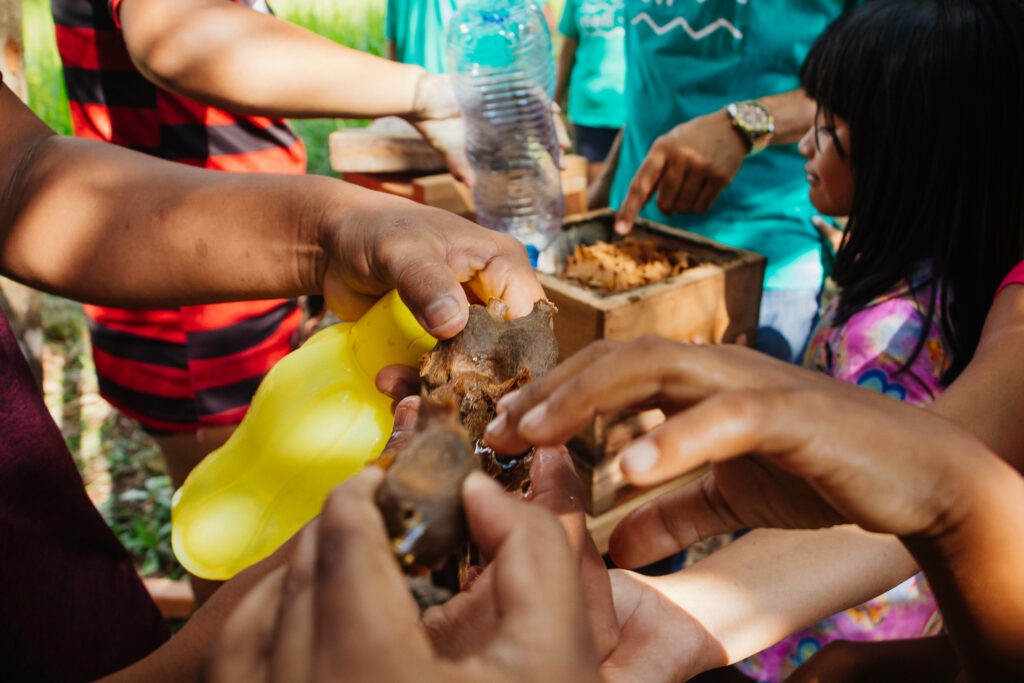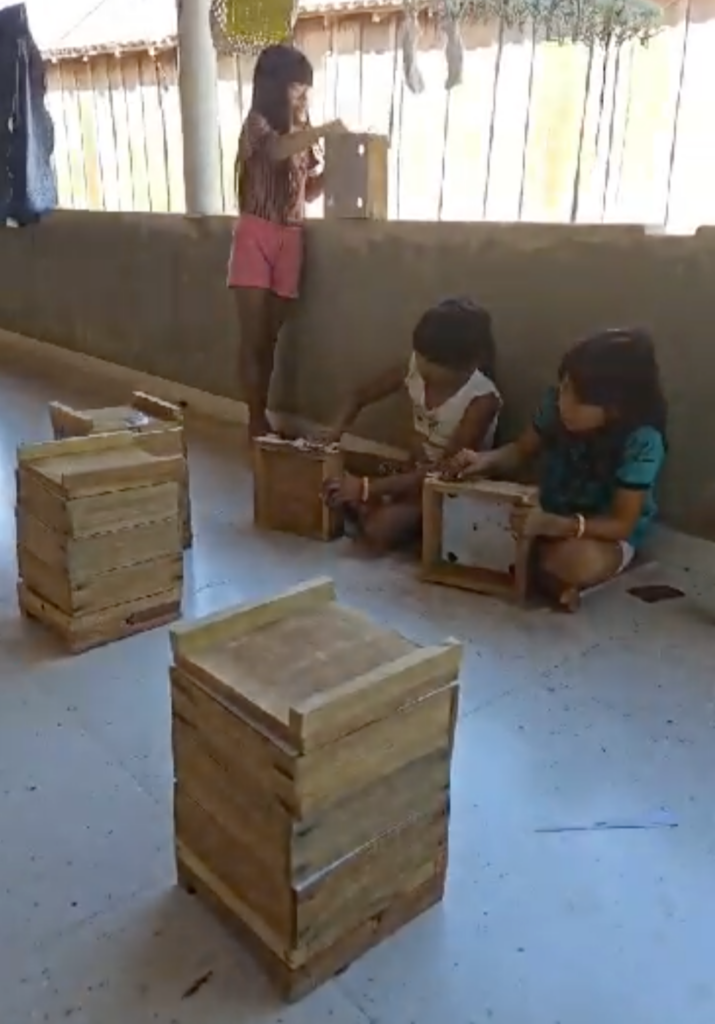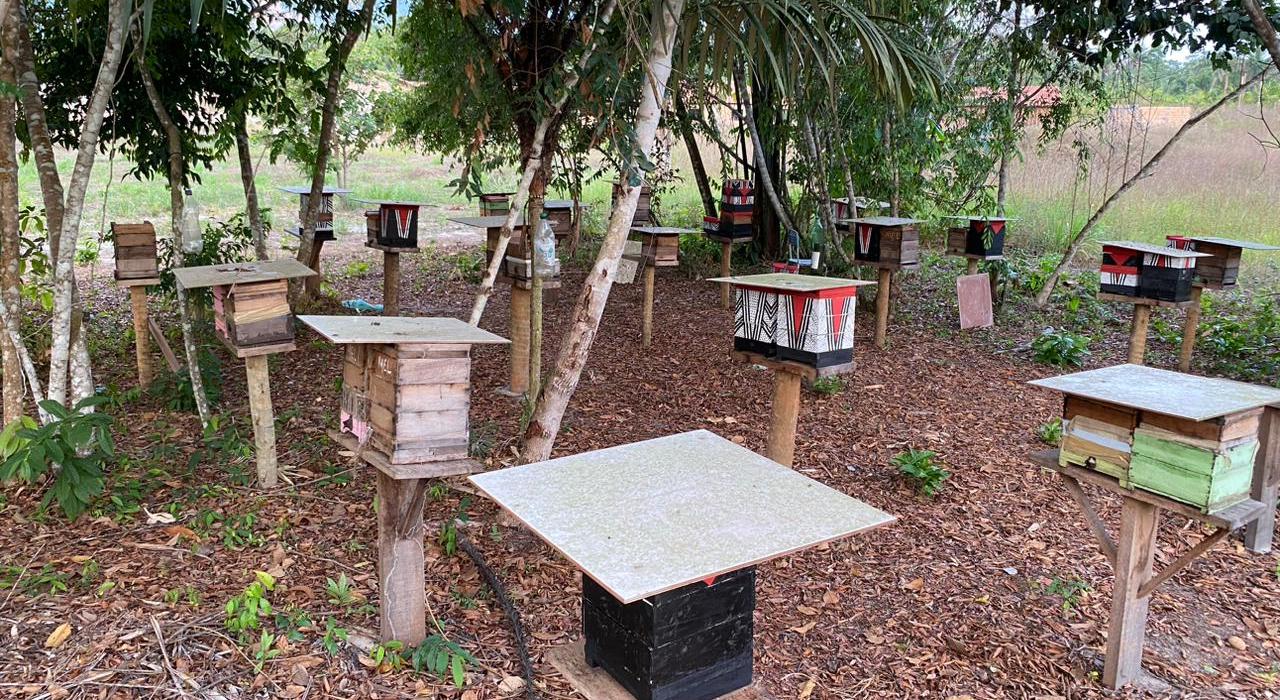The Bees and Culture project continues showcasing the tremendous strength of the Parkatejê community in the Mãe Maria Indigenous Land, where the project took place. The establishment of the meliponary has already led to further developments with the multiplication of beehives and painting on the new boxes, displaying the beauty of Parkatejê art!
Author: Ana Rosa. Leia em Português.
In late 2021, in partnership with the Indigenous Association Mpaja Mar Kaxuwari Parkatejê and Amazonian Conservation Team Brazil (ACT Brazil), we developed the Bees and Culture project: Meliponiculture and Cultural Support in the Printi-Pàr Indigenous Village (now called Tokurykti Jõkrikatêjê Village). The project brought workshops on Storytelling, Photography, and Meliponiculture to the village. Additionally, it facilitated the establishment of a meliponary and provided training for the community, led by Sávio Coelho, a professor at IFPA Marabá campus and an expert in stingless beekeeping. In a highly inspiring manner, the results of this project were multiplied, with strong engagement and motivation from the community.
Tuxati Parkatêjê, the chief of Tokurykti Jõkrikatêjê Village, not only spearheaded the project’s initiation but also played a pivotal role in encouraging the start of the Meli Network. In 2019, even before our organization was founded, when the team that would later form Meli initiated crowdfunding for meliponiculture activities with the Mojkàràkô (Kayapó) village, Tuxati was the first to propose similar activities in her community. Therefore, the actions of this leader have inspired us since the inception of this organization.
The interest was evident; honey holds fundamental value in Parkatejê culture, with products of stingless bees playing a role in their customs. Tuxati shared examples, such as their use in medicines and in the production of Tom, a material used in arrows. The partnership with ACT Brazil presented us with the ideal opportunity to develop a project with this community.

Image: First Meliponiculture workshop at Mãe Maria indigenous territory.
Antônio Guajajara, also a resident of Tokurykti Jõkrikatêjê Village, took it upon himself to lead the meliponary, seeking to benefit the entire community. He tends to the space with great dedication. According to Antônio, “What motivates me is knowing the numerous advantages of being a stingless beekeeper: we help the environment, it has low implementation and maintenance costs, and the colonies are easy to multiply.” The ease of care and multiplication of these colonies is a result of the Parkatejê people’s efforts to protect their territory, ensuring that the bees thrive in a biodiverse environment with abundant food sources.
Today, the meliponary boasts more than 60 beehives, multiplied from the original 40 provided by the project. Antônio adds, “The bees we raise are native to Brazil. In addition to being a significant force for fauna and flora, we obtain various products such as honey, pollen, propolis, and wax. This allows us to generate income from an activity that brings numerous benefits to the community and the Mãe Maria Indigenous Land.”

In the multiplication of beehives, the entire community participated. Children helped prepare the bee boxes, and women painted the bee boxes with Parkatejê designs, creating a beautiful visual for the space. “[This was done] to leave a mark of the community, of the body painting we use in our festivals,” said Tuxati Parkatêjê. She, her sister, her daughters, and her daughters-in-law all participated in this collaborative effort, once again demonstrating the strength of the meliponary as a shared space for the entire village.
It is beautiful to see how much bees have to teach us as well. When I asked Antônio what he enjoyed most about working with bees, he replied, “What most delights me is the fascinating way they organize themselves socially among each other; the world of bees is fantastic.” We are delighted with the positive developments of this project and its ongoing continuity. It is very inspiring to witness the fruits of such meaningful ideas, both for the communities and for nature, and it is in these moments that we feel our work is truly worthwhile.”
Your donation can have a positive impact on the world!
Subscribe to receive our Newsletter!
Find us also at Linkedin, Facebook, Twitter or Instagram
www.meli-bees.org
❤️


One Reply to “The Multiplication of Beeshives ”